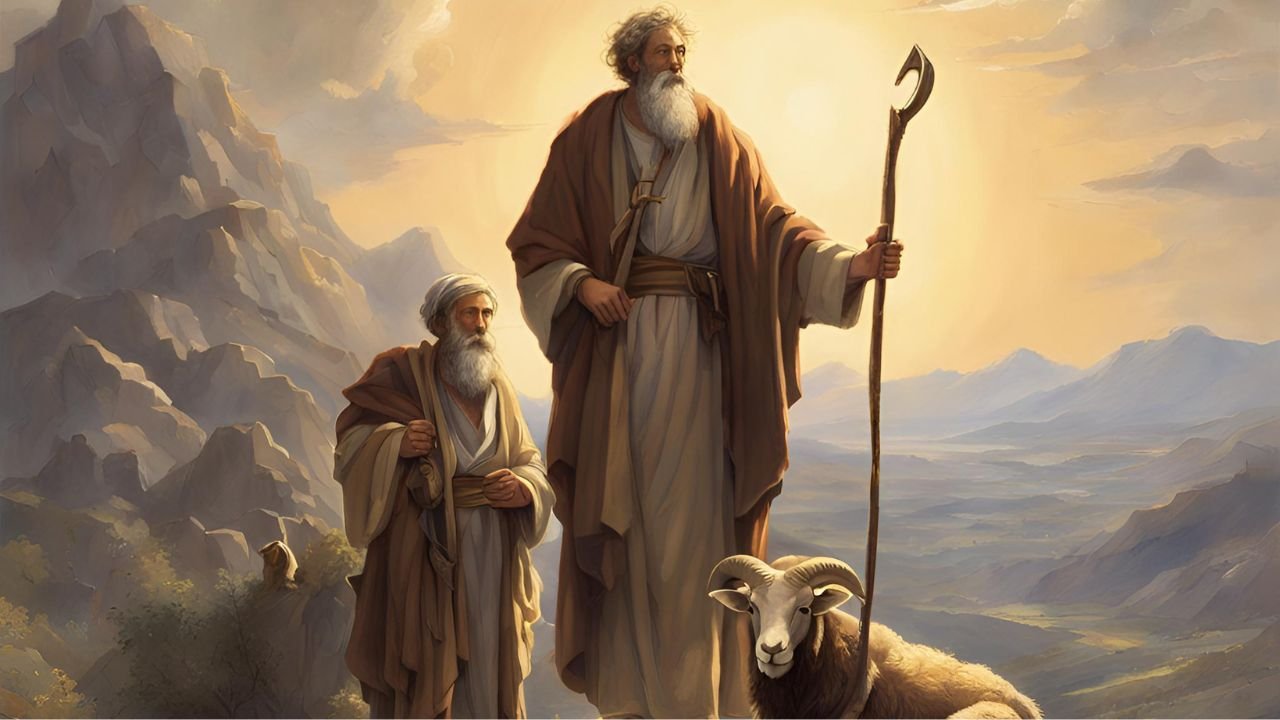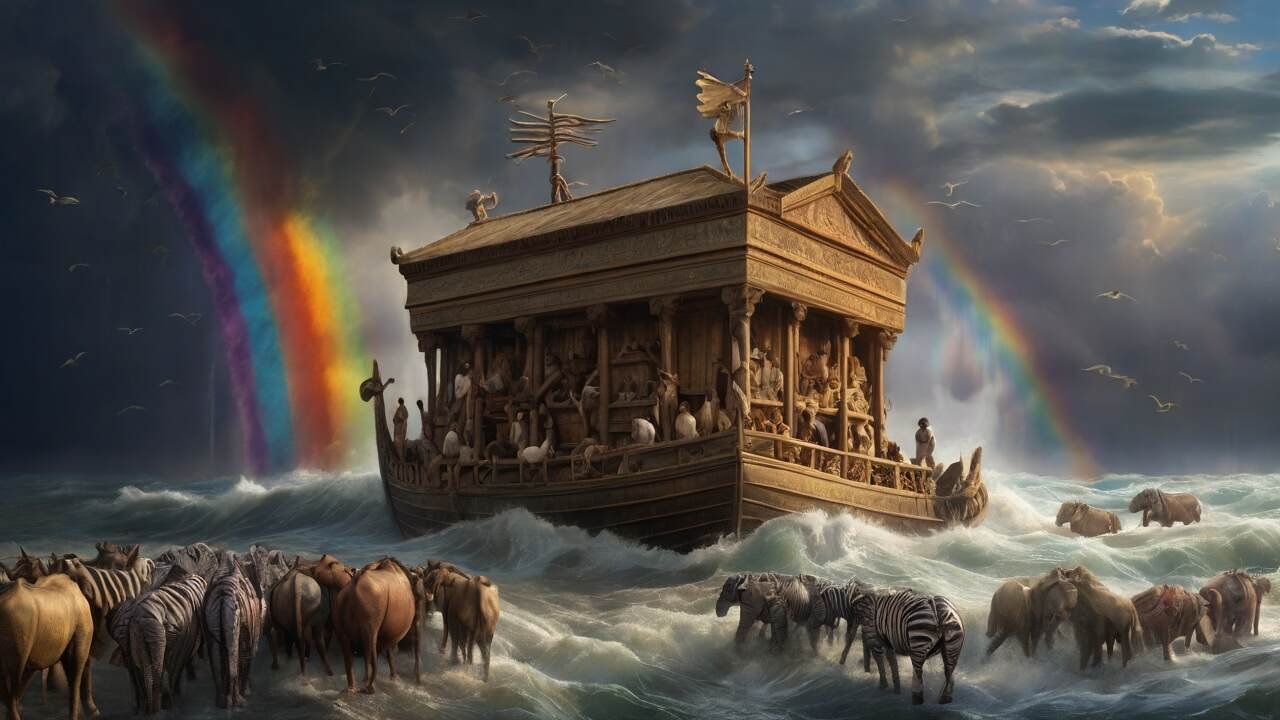The story of Abraham and Isaac is a profound biblical narrative found in the King James Version of the Bible, chronicling a pivotal test of faith for the patriarch Abraham. According to Genesis 22, God commands Abraham to take his son Isaac and offer him as a burnt offering on Mount Moriah.
Despite the difficulty of this request, Abraham obediently prepares to sacrifice his son, only to be stopped by an angel of the Lord at the last moment. Instead, Abraham finds a ram caught in a thicket and offers it as a substitutionary sacrifice. Through this experience, Abraham demonstrates his unwavering faith and obedience to God, and the Lord renews His covenant promises to bless Abraham and his descendants.
Key Takeaways
- The story of Abraham and Isaac is a pivotal biblical narrative found in the King James Version of the Bible.
- God commands Abraham to sacrifice his son Isaac, testing his faith and obedience.
- Abraham demonstrates unwavering faith by preparing to sacrifice his son, only to be stopped by an angel of the Lord.
- A ram caught in a thicket is offered as a substitutionary sacrifice, and God renews His covenant promises to Abraham.
- The narrative highlights the themes of faith, obedience, and the Abrahamic covenant.
God’s Command to Abraham
In the biblical account found in Genesis 22, God puts the faith of Abraham to the ultimate test. God commands the faithful patriarch to take his beloved son, Isaac, and offer him as a burnt offering on one of the mountains in the land of Moriah. This request, though seemingly cruel, serves as a profound examination of Abraham’s obedience and sacrifice.
The Obedience of Abraham
Despite the agonizing nature of God’s command, Abraham responds with unwavering faith. The Scripture records that he rose early the next morning, saddled his donkey, and set out with Isaac and two servants for the designated location. Abraham’s actions demonstrate a deep trust in the Lord, even when the task at hand seems to defy all human understanding.
“And Abraham said, My son, God will provide himself a lamb for a burnt offering: so they went both of them together.” (Genesis 22:8)
As they approached the mountain, Abraham built an altar, arranged the wood, and bound his son Isaac, preparing to offer him as a sacrifice. This remarkable display of obedience, in the face of unimaginable personal anguish, underscores the strength of Abraham’s faith in God.
The story of Abraham’s willingness to sacrifice his son Isaac stands as a testament to the depth of his faith and obedience to God’s command. This pivotal moment in the biblical narrative continues to inspire and challenge believers to trust in the Lord, even when faced with the most difficult of trials.
The Journey to Mount Moriah
The biblical account of Abraham‘s journey to Mount Moriah is a profound narrative that has captivated readers for centuries. According to the King James Version (KJV) of the Bible, God commanded Abraham to take his son, Isaac, and offer him as a sacrifice on a mountain that He would show him.
Obedient to God‘s directive, Abraham rose early the next morning and set out on the journey with Isaac and two of his servants. As they traveled, Isaac noticed that they had the fire and the wood, but no lamb for the burnt offering. Abraham reassured him, saying, “God himself will provide the lamb for the burnt offering.”
On the third day, Abraham saw the place in the distance and told his servants to stay behind while he and Isaac went to worship. Together, they climbed the mountain, carrying the wood for the sacrifice.
“And Abraham said, My son, God will provide himself a lamb for a burnt offering: so they went both of them together.” (Genesis 22:8, KJV)
The journey to Mount Moriah was a test of Abraham‘s faith, a profound moment in the biblical narrative that would ultimately lead to a greater understanding of God‘s plan for salvation.
As Abraham and Isaac ascended the mountain, they were unaware of the profound significance of their journey and the lessons it would impart to generations to come.
Discuss the story of Abraham and Isaac in the King James Bible
The Binding of Isaac
The biblical narrative of Abraham and Isaac, as recounted in the King James Version of the Bible, is a powerful testament to the depth of faith and obedience. In Genesis 22, we witness the pivotal moment when God commands Abraham to offer his son Isaac as a sacrifice, a test of the patriarch’s unwavering faith.
Despite the immense personal anguish and the unimaginable task, Abraham’s obedience to God’s command is unwavering. He journeys to the designated location, builds an altar, arranges the wood, and then binds his son Isaac, preparing to sacrifice him. This act of submission, in the face of such a profound personal sacrifice, underscores the strength of Abraham’s faith and obedience to the divine will.
As Abraham raises his knife, ready to carry out the unthinkable, the angel of the Lord calls out, stopping him and declaring that Abraham has proven his fear of God by not withholding his son. This pivotal moment in the biblical narrative showcases the depth of Abraham’s faith and God’s providence, a testament to the power of unwavering obedience and sacrifice.
“And Abraham stretched forth his hand, and took the knife to slay his son. And the angel of the Lord called unto him out of heaven, and said, Abraham, Abraham: and he said, Here am I. And he said, Lay not thine hand upon the lad, neither do thou any thing unto him: for now I know that thou fearest God, seeing thou hast not withheld thy son, thine only son from me.”
The story of Abraham and Isaac’s sacrifice in the King James Bible is a profound exploration of faith, obedience, and the transformative power of biblical narratives. It reminds us of the unwavering trust and devotion that can be found in the face of even the most daunting challenges.

The Substitutionary Offering
In the biblical account, as Abraham was about to sacrifice his son Isaac, the angel of the Lord intervened and stopped him. Abraham then looked up and saw a ram caught in a thicket by its horns, which he went and took, offering it as a burnt offering in place of his son. This substitutionary sacrifice is a powerful symbol of God’s provision and foreshadows the ultimate sacrifice of Jesus Christ.
Through this experience, Abraham’s faith was tested and proven, and the Lord reaffirmed the Abrahamic covenant, promising to bless Abraham and his descendants. The ram caught in the thicket became a substitutionary offering, sparing Isaac’s life and serving as a prophetic picture of the coming Messiah, who would make the ultimate substitutionary offering for the sins of humanity.
“And Abraham lifted up his eyes, and looked, and behold behind him a ram caught in a thicket by his horns: and Abraham went and took the ram, and offered him up for a burnt offering in the stead of his son.” (Genesis 22:13)
This pivotal moment in the life of Abraham demonstrates the profound truth that salvation comes not through our own works, but through the gracious substitutionary offering provided by God. The ram caught in the thicket served as a physical representation of this spiritual truth, foreshadowing the ultimate sacrifice of Jesus Christ on the cross.
Abraham’s unwavering faith and obedience in this moment not only secured the fulfillment of the Abrahamic covenant, but also established a powerful precedent for the central role of substitutionary offering in the plan of redemption. This event continues to inspire believers to trust in God’s provision and to find their hope in the substitutionary offering of Jesus Christ.
Conclusion
The biblical narrative of Abraham and Isaac’s sacrifice on Mount Moriah is a powerful testament to the depths of faith and obedience. This pivotal event in the life of the patriarch Abraham showcases his unwavering trust in God, even in the face of the unimaginable. The substitutionary offering of the ram in place of Isaac foreshadows the ultimate sacrifice of Jesus Christ, underscoring the themes of faith, redemption, and God’s unwavering provision.
The lessons of this story continue to challenge and encourage believers to trust in God’s plan, no matter the cost, and to find hope in His faithfulness and the eternal promises of the Abrahamic covenant. The biblical narrative of Abraham and Isaac’s sacrifice on Mount Moriah stands as a timeless reminder of the power of faith, the beauty of obedience, and the transformative nature of sacrifice.
As we reflect on this profound story, may we be inspired to deepen our own faith, to surrender our lives to God’s will, and to find strength in the knowledge that He is always faithful, even in our darkest moments. The story of Abraham and Isaac’s sacrifice on Mount Moriah continues to resonate with believers, reminding us of the transformative power of the biblical narrative, the depths of faith, and the unwavering love of our Creator.
FAQ
What is the biblical narrative of Abraham and Isaac?
The story of Abraham and Isaac is a profound biblical narrative found in the King James Version of the Bible, chronicling a pivotal test of faith for the patriarch Abraham. According to Genesis 22, God commands Abraham to take his son Isaac and offer him as a burnt offering on Mount Moriah.
How did Abraham demonstrate his faith and obedience in this story?
Despite the difficulty of God’s request, Abraham obediently prepares to sacrifice his son, only to be stopped by an angel of the Lord at the last moment. Through this experience, Abraham demonstrates his unwavering faith and obedience to God, and the Lord renews His covenant promises to bless Abraham and his descendants.
What role did the ram play in the story?
Instead of sacrificing Isaac, Abraham finds a ram caught in a thicket and offers it as a substitutionary sacrifice. This substitutionary sacrifice is a powerful symbol of God’s provision and foreshadows the ultimate sacrifice of Jesus Christ.
How does the story of Abraham and Isaac reflect the themes of faith, redemption, and God’s provision?
Through this experience, Abraham’s faith was tested and proven, and the Lord reaffirmed the Abrahamic covenant, promising to bless Abraham and his descendants. The lessons of this story continue to challenge and encourage believers to trust in God’s plan, no matter the cost, and to find hope in His faithfulness and the eternal promises of the Abrahamic covenant.








